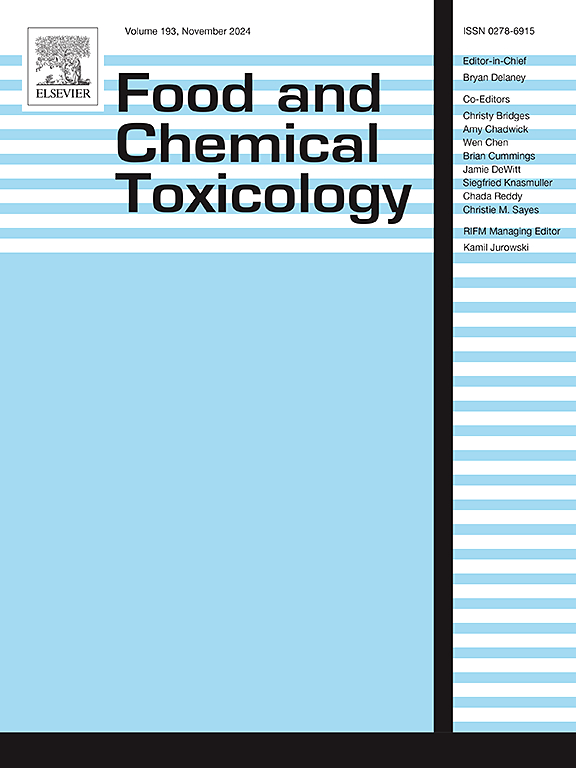聚苯乙烯纳米塑料通过细胞周期阻滞和JNK-MAPK途径介导的氧化应激损害早期妊娠小鼠子宫内膜脱胞化
IF 3.5
3区 医学
Q2 FOOD SCIENCE & TECHNOLOGY
引用次数: 0
摘要
环境中普遍存在的聚苯乙烯纳米塑料(PS-NPs)已成为一个重大的公共卫生问题。它们的生物安全性,特别是对女性生育能力的影响,已引起越来越多的关注。我们之前的研究表明,PS-NPs会损害子宫内膜去个体化。然而,其潜在机制尚不清楚。在这项研究中,我们探讨了PS-NPs损害早期妊娠小鼠去个体化的潜在机制。我们的结果显示,PS-NPs破坏子宫脱个体化。具体来说,PS-NPs抑制子宫内膜细胞增殖,阻碍蜕膜多倍体细胞的形成。此外,PS-NPs通过破坏蜕膜中氧化应激和抗氧化防御之间的平衡诱导子宫氧化损伤。PS-NPs干扰CyclinD1-Cdk4、CyclinE1-Cdk2、CyclinA1-Cdk2和CyclinB1-Cdk1复合物的形成,最终损害G1-S和G2-M期的细胞周期进程。抑制JNK-MAPK通路可减轻ps - nps暴露的妊娠小鼠子宫内过度氧化应激,恢复缺陷脱胎化,改善胚胎着床。进一步分析发现JNK-MAPK通路介导ps - nps诱导的子宫内膜增殖抑制。这些发现表明,由CyclinD1-Cdk4、CyclinE1-Cdk2、CyclinA1-Cdk2和CyclinB1-Cdk1复合物活性降低驱动的子宫内膜增殖受损可能是ps - nps诱导的脱体化缺陷的重要因素。此外,JNK-MAPK通路可能是这些有害影响的介质。本文章由计算机程序翻译,如有差异,请以英文原文为准。
Polystyrene nanoplastics impair endometrial decidualization via cell cycle arrest and JNK-MAPK pathway-mediated oxidative stress in early pregnant mice
The ubiquitous polystyrene nanoplastics (PS-NPs) in the environment have emerged as a significant public health concern. Their biological safety, particularly their impact on female fertility, has garnered increasing attention. Our previous study demonstrated that PS-NPs impaired endometrial decidualization. However, the underlying mechanism remains unclear. In this study, we explored the underlying mechanism by which PS-NPs compromised decidualization in early pregnant mice. Our results showed that PS-NPs disrupted uterine decidualization. Specifically, PS-NPs inhibited endometrial cell proliferation and hindered the formation of decidual polyploid cells. Additionally, PS-NPs induced oxidative damage in uteri by disrupting the balance between oxidative stress and antioxidative defenses in the decidua. PS-NPs interfered with the formation of CyclinD1-Cdk4, CyclinE1-Cdk2, CyclinA1-Cdk2, and CyclinB1-Cdk1 complexes, ultimately impairing cell cycle progression at the G1-S and G2-M phases. Inhibition of the JNK-MAPK pathway alleviated excessive oxidative stress in uteri, restored defective decidualization, and improved embryo implantation in PS-NPs-exposed pregnant mice. Further analysis revealed that the JNK-MAPK pathway mediated the PS-NPs-induced suppression of endometrial proliferation. These findings suggested that impaired endometrial proliferation driven by reduced activity of CyclinD1-Cdk4, CyclinE1-Cdk2, CyclinA1-Cdk2, and CyclinB1-Cdk1 complexes may be an important contributor to PS-NPs-induced decidualization defect. Moreover, the JNK-MAPK pathways may be mediators of these detrimental effects.
求助全文
通过发布文献求助,成功后即可免费获取论文全文。
去求助
来源期刊

Food and Chemical Toxicology
工程技术-毒理学
CiteScore
10.90
自引率
4.70%
发文量
651
审稿时长
31 days
期刊介绍:
Food and Chemical Toxicology (FCT), an internationally renowned journal, that publishes original research articles and reviews on toxic effects, in animals and humans, of natural or synthetic chemicals occurring in the human environment with particular emphasis on food, drugs, and chemicals, including agricultural and industrial safety, and consumer product safety. Areas such as safety evaluation of novel foods and ingredients, biotechnologically-derived products, and nanomaterials are included in the scope of the journal. FCT also encourages submission of papers on inter-relationships between nutrition and toxicology and on in vitro techniques, particularly those fostering the 3 Rs.
The principal aim of the journal is to publish high impact, scholarly work and to serve as a multidisciplinary forum for research in toxicology. Papers submitted will be judged on the basis of scientific originality and contribution to the field, quality and subject matter. Studies should address at least one of the following:
-Adverse physiological/biochemical, or pathological changes induced by specific defined substances
-New techniques for assessing potential toxicity, including molecular biology
-Mechanisms underlying toxic phenomena
-Toxicological examinations of specific chemicals or consumer products, both those showing adverse effects and those demonstrating safety, that meet current standards of scientific acceptability.
Authors must clearly and briefly identify what novel toxic effect (s) or toxic mechanism (s) of the chemical are being reported and what their significance is in the abstract. Furthermore, sufficient doses should be included in order to provide information on NOAEL/LOAEL values.
 求助内容:
求助内容: 应助结果提醒方式:
应助结果提醒方式:


